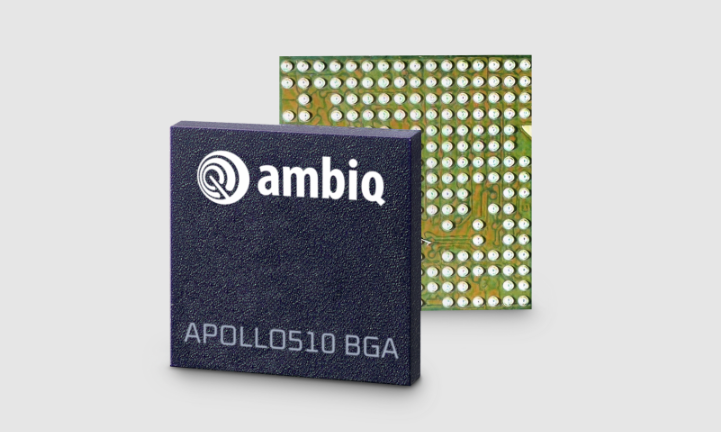 INFRA
INFRA
 INFRA
INFRA
 INFRA
INFRA
Edge artificial intelligence chipmaker Ambiq Micro Inc. is looking to raise up to $85 million from investors through an initial public offering that’s expected to price before the end of the month.
The Austin-based chip startup, which filed its initial IPO prospectus earlier this month, believes it can tempt investors with a low-priced entry into the booming market for AI chips. According to a filing with the U.S. Securities and Exchange Commission, it plans to sell 3.4 million common shares at between $22 and $25 each.
At the high end of that range, Ambiq would command a valuation of $426 million, based on the number of outstanding shares listed in the filing. That’s more or less in-line with Ambiq’s $450 million valuation, which was mentioned when the company closed on its last funding round, a $94.6 million Series G raise in September 2023.
The startup is looking to cater to the growing demand for edge AI in areas such as wearable devices, industrial internet of things, and factory automation.
Ambiq’s processors are based on a Subthreshold Power Optimized Technology or SPOT architecture and designed to provide on-device AI processing in real-time. They offer energy-efficiency that’s an order of magnitude greater than traditional chip designs. According to the company, its chips use around five times less energy than legacy central processing units, making them ideal for low-powered devices such as fitness trackers and industrial applications like crop monitoring.
A recent study by Mordor Intelligence forecasts the market for edge AI to grow from $3.67 billion in 2025 to more than $9.75 billion by the end of the decade, reflecting a compound annual growth rate of almost 22%. Ambiq is in a prime position to capitalize on that increasing demand, with its SPOT chip technology operating at 10 times lower subthreshold voltages than traditional CPUs, delivering around 80% lower energy consumption and 30-times more AI energy efficiency.
Ambiq has some big customers already. Its latest flagship processor, the Apollo 510 system-on-chip (pictured), is the processor found in Samsung Electronics Co. Ltd.’s Galaxy Watch devices. In the last year, it claims to have shipped more than 270 million SPOT-powered devices, with 40% of those “AI-enabled.” Though competing chipmakers such as Nordic Semiconductor and STMicroelectronics N.V. also sell low-power chips, they are thought to lack the subthreshold optimization that sets Ambiq’s products apart.
In addition, Ambiq boasts ecosystem integrations with AI companies such as EdgeImpulse Inc., whose model compression tools make it easy to deploy complex AI models on low-powered devices and run predictive maintenance and voice recognition applications, for example.
Ambiq also has a much broader footprint than many of its energy-efficient chip rivals. While the likes of Syntiant Inc. are focused on voice AI applications, Ambiq’s chips span wearables, smart home gadgets, drones, industrial sensors and more, positioning it to capture a much larger market share.
For now, Ambiq remains unprofitable. In its most recent quarter ended March 31, the company delivered a net loss of $8.3 million on revenue of $15.7 million. But it does appear to be making slow progress. In the same period one year earlier, it reported a net loss of $9.8 million on lower sales of $15.2 million.
The chipmaker is backed by investors including the chip design giant Arm Holdings Plc., Kleiner Perkins, EDB Investments Pte, VentureTech Alliance and Conducive Ventures.
In its filing, Ambiq said Bank of America Corp. and UBS Group AG will lead the offering, which is expected to be priced on July 29 after the market closes on the New York Stock Exchange. It plans to trade on the NYSE under the ticker symbol “AMBQ.”
Ambiq’s filing came on a busy day that saw the graphic design software firm Figma Inc. and the crypto services company BitGo Holdings Inc. also file paperwork for their own IPOs.
The flurry of IPO filings signals that investors are fast warming up to technology stocks, following a long period of uncertainty that saw the number of new market listings slow to a trickle. Figma is looking to raise as much as $1.03 billion from its share sale, while BitGo has not yet declared the number of shares or price range of its stock offering.
Constellation Research Inc. analyst Holger Mueller said IPOs are hot and increasing in number, driven by pent up appetite from investors who have had to endure a long wait for new market entrants. “Many of the new IPOs are AI companies, and while the battle for AI compute in the data center is pretty much set with Nvidia leading the way, it’s a different story at the network edge,” the analyst said. “This is a wide open market and Ambiq Micro has a competitive offering that could see it prosper.”
Support our mission to keep content open and free by engaging with theCUBE community. Join theCUBE’s Alumni Trust Network, where technology leaders connect, share intelligence and create opportunities.
Founded by tech visionaries John Furrier and Dave Vellante, SiliconANGLE Media has built a dynamic ecosystem of industry-leading digital media brands that reach 15+ million elite tech professionals. Our new proprietary theCUBE AI Video Cloud is breaking ground in audience interaction, leveraging theCUBEai.com neural network to help technology companies make data-driven decisions and stay at the forefront of industry conversations.